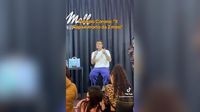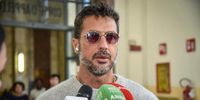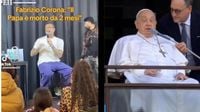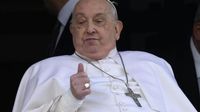In a dramatic twist that left many questioning the reliability of information sources, Fabrizio Corona recently ignited controversy by declaring that Pope Francis had died two months ago. This assertion, made during an event at the MaxiMall Pompeii in Torre Annunziata on March 21, 2025, quickly gained traction not just as an outrageous claim but as a reflection of a growing skepticism towards traditional media.
During his speech, Corona confidently stated: "The Pope is dead, if he isn't, I'll retire," a challenge that seemed to mock not only the gravity of the situation but also the public’s expectation of accountability from figures like him. He elaborated, asserting, "The Pope has been dead for two months. If a video image comes out within the next five months showing him speaking live, I will retire to private life." Such claims resonate with societal trends concerned with misinformation and conspiracy theories, as viewers engaged with the spectacle rather than relying on verified facts.
As if the universe conspired to derail Corona’s thunder, Pope Francis made an unexpected public appearance on March 23, greeting the faithful from his room at the Policlinico Gemelli before being discharged. Corona’s proclamations crumbled in an instant, overshadowed by this very real, unfiltered moment of human connection. Images of the Pope waving to his supporters delivered a poignant reminder of the thin line between speculation and truth.
In the days leading up to this event, speculation about Pope Francis's health had reached a fever pitch, with many fearing for his life due to a series of respiratory illnesses that had required hospitalization for over a month. During this time, a slew of conspiracy theories took flight, with Corona being one of the most vocal proponents of the theory that the Pope had indeed passed away—an idea he perpetuated with no substantial evidence.
As soon as news broke of the Pope’s appearance, it left everyone questioning Corona’s credibility. Following the public event, Corona was quick to respond, expressing doubt. "Are you sure it's really him?" he questioned, attempting to reclaim the narrative despite the direct evidence before the public's eyes. This instant shift from bold declarations to doubt encapsulated the often chaotic dance between celebrity and fact.
The backlash against Corona's statements didn’t just end with social media chatter. It highlighted a prevailing cultural crisis characterized by skepticism towards media and authority figures. It’s crucial to note that while Corona’s approach stems from a desire for attention—tinged with narcissism—many resonate with his sentiments, reinforcing a disturbing trend where misinformation can easily find a foothold in public discourse.
Such incidents shed light on the broader implications of how important figures, whether in media or public service, influence public perception. The response to Corona's indecorous claims also ignited conversations about how the balance of media representation shapes what becomes reality in the eyes of the public.
Ultimately, the resoluteness of Pope Francis standing before his supporters encapsulated a significant counter-narrative to Corona's hyperbolic declarations. The Pope’s appearance served as a reminder of the importance of witness and presence—elements that defeat conspiracy theories through simple human connection.
While the seductive allure of conspiracy theories may provide a quick fix for those disillusioned with the media, the events of March 23 demonstrated the significance of transparency and genuine representation. It urges a more profound consideration of the need for trustworthy narratives in a world inundated with sensationalism.
The saga of Fabrizio Corona and Pope Francis is not merely a tale of one man's assertions but a wider commentary on the cultural struggle for truth in an era steeped in skepticism. As the public reflects on Corona's dismissal after the Pope's undeniable appearance, it raises pertinent questions about accountability and the responsibility of public figures in perpetuating—or debunking—misinformation.




